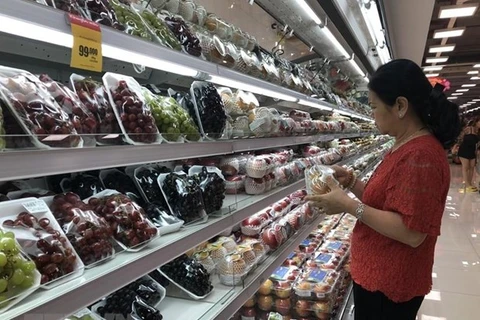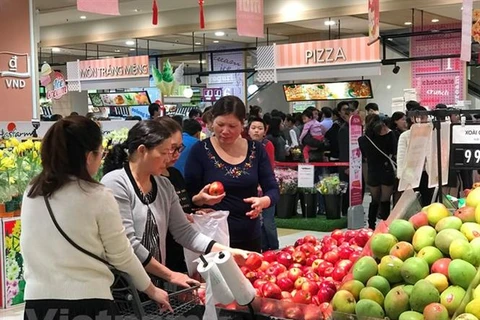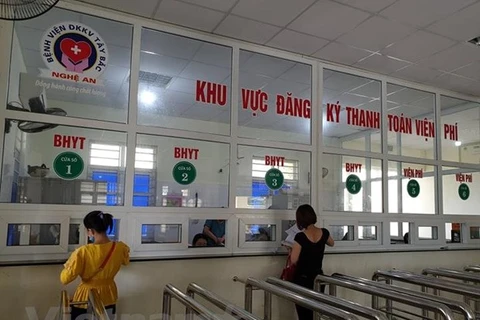Hanoi (VNA) – The average Consumer Price Index (CPI) in the first half of 2019 increased 2.64 percent year-on-year, the lowest level over the last three years, according to the General Statistics Office (GSO).
The six-month CPI figures for 2017 and 2018 were 4.15 percent and 3.29 percent, respectively.
The June figure was 0.09 percent lower than May’s and only 1.41 percent higher than the end of 2018, the GSO announced at a conference on the market and prices on June 28.
Head of the GSO’s Price Statistics Department Do Thi Ngoc said the six-month CPI remained low despite the fluctuation of prices of oil and gas, electricity, water, textbooks and healthcare services, as well as the lingering African swine fever outbreak that has taken a heavy toll on the livestock industry.
She attributed the CPI’s slight increase to abundant domestic supply, authorities’ efforts in price management and the State Bank of Vietnam’s flexible monetary policies.
The CPI of three out of the 11 groups of goods and services declined from last month, including transport (1.73 percent), housing and construction materials (2 percent), and telecommunications (0.1 percent).
Of the goods and services groups with gains, drinks and cigarettes saw the biggest surge of 0.33 percent while medicines and health services recorded the lowest growth of 0.05 percent.
As of June 25, Vietnam had culled about 2.82 million pigs infected with African swine fever, or 10 percent of the total herd, in a bid to control the spread of the disease that has swept through 60 cities and provinces. Pork prices dropped sharply in the first few days of June but edged up again in the middle of the month due to the short supply. However, for the whole month, the price of pork still fell 1.39 percent month on month.
The country is entering peak harvest time for crops, making for plentiful rice supply. Meanwhile, rice exports have struggled due to falling demand from foreign markets, especially China which has set tighter controls on imports from Vietnam. Vietnam’s rice exports in the first half of 2019 were estimated at 3.38 million tonnes, worth close to 1.46 billion USD, down 2.88 percent and 17.6 percent, respectively, year on year.
These factors contributed to the 0.54 percent decrease in the price of the grain in June.
The domestic price of gas also experienced a 8.79 percent slide as the global price fell by 105 USD per tonne to 422.5 USD per tonne, contributing to a 0.11 percent contraction in CPI, the GSO official added.
Ngoc said domestic demand and supply for the US dollar were basically stable so the exchange rate just picked up 0.3 percent, standing at 23,400 VND per USD, though the greenback got stronger amid worries over the escalating US-China trade war.
Following the US dollar’s trend, the price of gold went up 1.98 percent to around 3.73 million VND per tael of SJC gold.
The domestic price of gold rose as the global price of the precious metal reached its six-year record high due to political tension in the Middle East and the expectation that the Federal Reserve would cut interest rates, Ngoc explained. By June 24, the world’s average price of gold surged 5.1 percent from the previous month.
Basic inflation (CPI exclusive of foodstuff, fresh food, energy, and healthcare and education services) in June gained 0.16 percent from last month and 1.96 percent year on year. The six-month figure expanded 1.87 percent year on year.
The CPI rise at a three-year low in the first half of 2019 has greatly helped stabilise the macro-economy, promote economic growth and leave much room for inflation control for the remainder of the year, Deputy Prime Minister Vuong Dinh Hue said at a meeting of the Steering Committee for Price Management earlier this week.
He also urged relevant authorities to keep core inflation within some 1.8 percent this year.–VNA

























